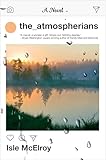Here’s a quick look at some notable books—new titles from Alex McElroy, our own Nick Ripatrazone, Jim Shepard, and more—that are publishing this week.
Want to learn more about upcoming titles? Then go read our most recent book preview. Want to help The Millions keep churning out great books coverage? Then become a member today.
The Atmospherians by Alex McElroy
 Here’s what Publishers Weekly had to say about The Atmospherians: “McElroy’s impressive debut novel (after the chapbook Daddy Issues) lands a well-crafted jab at toxic masculinity and attempts to control it. Sasha Marcus, creator of a popular wellness brand for women, is a social media sensation until her foul response to an internet troll gets her cancelled. Suddenly unemployed, at home, and with men’s rights activists demonstrating outside her apartment, Sasha is desperate. So when her visionary if misguided childhood friend, Dyson, reaches out with a proposal to start a cult, Sasha agrees. Housed at an abandoned property, the cult—named The Atmosphere—has one mission: to save white men from themselves. Dyson, a failed actor with an eating disorder, recruits the men under the false pretense of job training. Operations begin with men being forced to purge their food after meals, followed by hard labor around the property and therapy sessions with Sasha. As the pressure builds and a job offer lingers in Sasha’s voicemail, her friendship with Dyson is tested. Things worsen when The Atmosphere appears in the news, and Sasha is presumed to be the sole leader. The author conveys Sasha’s dilemma in rich prose and haunting images, using a finely honed satirical lens. This notable debut makes hay with the miasma of contemporary culture.”
Here’s what Publishers Weekly had to say about The Atmospherians: “McElroy’s impressive debut novel (after the chapbook Daddy Issues) lands a well-crafted jab at toxic masculinity and attempts to control it. Sasha Marcus, creator of a popular wellness brand for women, is a social media sensation until her foul response to an internet troll gets her cancelled. Suddenly unemployed, at home, and with men’s rights activists demonstrating outside her apartment, Sasha is desperate. So when her visionary if misguided childhood friend, Dyson, reaches out with a proposal to start a cult, Sasha agrees. Housed at an abandoned property, the cult—named The Atmosphere—has one mission: to save white men from themselves. Dyson, a failed actor with an eating disorder, recruits the men under the false pretense of job training. Operations begin with men being forced to purge their food after meals, followed by hard labor around the property and therapy sessions with Sasha. As the pressure builds and a job offer lingers in Sasha’s voicemail, her friendship with Dyson is tested. Things worsen when The Atmosphere appears in the news, and Sasha is presumed to be the sole leader. The author conveys Sasha’s dilemma in rich prose and haunting images, using a finely honed satirical lens. This notable debut makes hay with the miasma of contemporary culture.”
In the Event of Contact by Ethel Rohan
 Here’s what Publishers Weekly had to say about In the Event of Contact: “Rohan (The Weight of Him) delivers a striking collection about loners. In the title story, Ruth copes with an extreme aversion to touch, which began in kindergarten after a boy’s constant touching caused her to have a seizure. As a teen, Ruth is taught at home by a private tutor, a man whose inappropriate methods to cure Ruth shocks her two triplet sisters. In ‘Everywhere She Went,’ a 26-year-old narrator is reminded of her friend Hazel, who went missing when they were children, after her boyfriend mentions a co-worker with the same name. The narrator is haunted all over again by foggy memories of her friend, and reflects on how the disappearance has made it difficult for her to bond with others ever since. In ‘Rare, but Not Impossible,’ Margo returns home to Dublin from New York City for a friend’s wedding, disappointed to find her parents didn’t make the trek to the airport for her. While describing Margo’s cab ride, Rohan writes, ‘No matter where she was, she never sounded like she belonged.’ Margo’s role in the wedding makes her feel more isolated and alienated. Rohan makes the most of situations in which her protagonists grapple with what it feels like to be different and unable to be close with others. This is worth a look.”
Here’s what Publishers Weekly had to say about In the Event of Contact: “Rohan (The Weight of Him) delivers a striking collection about loners. In the title story, Ruth copes with an extreme aversion to touch, which began in kindergarten after a boy’s constant touching caused her to have a seizure. As a teen, Ruth is taught at home by a private tutor, a man whose inappropriate methods to cure Ruth shocks her two triplet sisters. In ‘Everywhere She Went,’ a 26-year-old narrator is reminded of her friend Hazel, who went missing when they were children, after her boyfriend mentions a co-worker with the same name. The narrator is haunted all over again by foggy memories of her friend, and reflects on how the disappearance has made it difficult for her to bond with others ever since. In ‘Rare, but Not Impossible,’ Margo returns home to Dublin from New York City for a friend’s wedding, disappointed to find her parents didn’t make the trek to the airport for her. While describing Margo’s cab ride, Rohan writes, ‘No matter where she was, she never sounded like she belonged.’ Margo’s role in the wedding makes her feel more isolated and alienated. Rohan makes the most of situations in which her protagonists grapple with what it feels like to be different and unable to be close with others. This is worth a look.”
Nervous System by Lina Meruane (translated by Megan McDowell)
 Here’s what Publishers Weekly had to say about Nervous System: “Chilean writer Meruane’s razor-sharp novel (after Seeing Red) follows a young woman struggling to complete a dissertation in astrophysics. Ella’s doctoral work is going nowhere; she can’t even decide on a topic, something she keeps secret from her partner, El, and her father, who has poured his life savings into her education. (Her father, in turn, has kept his investment in her education a secret from Ella’s stepmother and half siblings.) Desperate, Ella invokes the spirit of her mother, who died in childbirth, praying for her to afflict her with a disease that will excuse her from her teaching responsibilities. Obsession with illness and injury is the overriding subject of the narrative—Ella manifests an undiagnosable spinal pain, El is injured in an explosion, her stepmother’s breast cancer returns. Her father, himself a doctor, is hospitalized. Meruane is a writer of undeniable talent; her portrayal of the body as a site of suffering is nuanced and unflinching. The years of dictatorship and ‘still-undiscovered graves’ in Ella’s unnamed ‘preterit country,’ and the migrant ‘problem’ in her ‘country of the present,’ where people speak a different language, add more dark layers. While there isn’t much in the way of momentum, on a sentence level it’s unimpeachable. The result is a challenge, but one that gives the reader much to chew on.”
Here’s what Publishers Weekly had to say about Nervous System: “Chilean writer Meruane’s razor-sharp novel (after Seeing Red) follows a young woman struggling to complete a dissertation in astrophysics. Ella’s doctoral work is going nowhere; she can’t even decide on a topic, something she keeps secret from her partner, El, and her father, who has poured his life savings into her education. (Her father, in turn, has kept his investment in her education a secret from Ella’s stepmother and half siblings.) Desperate, Ella invokes the spirit of her mother, who died in childbirth, praying for her to afflict her with a disease that will excuse her from her teaching responsibilities. Obsession with illness and injury is the overriding subject of the narrative—Ella manifests an undiagnosable spinal pain, El is injured in an explosion, her stepmother’s breast cancer returns. Her father, himself a doctor, is hospitalized. Meruane is a writer of undeniable talent; her portrayal of the body as a site of suffering is nuanced and unflinching. The years of dictatorship and ‘still-undiscovered graves’ in Ella’s unnamed ‘preterit country,’ and the migrant ‘problem’ in her ‘country of the present,’ where people speak a different language, add more dark layers. While there isn’t much in the way of momentum, on a sentence level it’s unimpeachable. The result is a challenge, but one that gives the reader much to chew on.”
Let the Record Show by Sarah Schulman
 Here’s what Publishers Weekly had to say about Let the Record Show: “Novelist and AIDS activist Schulman (Maggie Terry) recounts the successes and failures of the New York chapter of the AIDS Coalition to Unleash Power (ACT UP) in this fine-grained history. Drawing on interviews with 188 members of ACT UP New York, Schulman showcases the diverse array of people who worked to raise awareness about AIDS, and notes their simultaneous involvement in related issues including homelessness, gender inequity in medicine, and needle exchange programs. She also explains how ACT UP New York leveraged an ‘inside/outside’ strategy in which some members worked collaboratively with politicians and health officials while others created dramatic acts of protest, such as the 1989 infiltration of the New York Stock Exchange, when seven activists handcuffed themselves to a banister in a VIP balcony and threw fake hundred-dollar bills onto the trading room floor to pressure a pharmaceutical company to lower the $10,000-per-year price tag of the AIDS medication AZT. Readers less familiar with ACT UP may wish for a clearer explanation of its organizational structure and more narrative cohesion than Schulman provides. Still, her firsthand perspective and copious details provide a valuable testament to the courage and dedication of many unheralded activists.”
Here’s what Publishers Weekly had to say about Let the Record Show: “Novelist and AIDS activist Schulman (Maggie Terry) recounts the successes and failures of the New York chapter of the AIDS Coalition to Unleash Power (ACT UP) in this fine-grained history. Drawing on interviews with 188 members of ACT UP New York, Schulman showcases the diverse array of people who worked to raise awareness about AIDS, and notes their simultaneous involvement in related issues including homelessness, gender inequity in medicine, and needle exchange programs. She also explains how ACT UP New York leveraged an ‘inside/outside’ strategy in which some members worked collaboratively with politicians and health officials while others created dramatic acts of protest, such as the 1989 infiltration of the New York Stock Exchange, when seven activists handcuffed themselves to a banister in a VIP balcony and threw fake hundred-dollar bills onto the trading room floor to pressure a pharmaceutical company to lower the $10,000-per-year price tag of the AIDS medication AZT. Readers less familiar with ACT UP may wish for a clearer explanation of its organizational structure and more narrative cohesion than Schulman provides. Still, her firsthand perspective and copious details provide a valuable testament to the courage and dedication of many unheralded activists.”
Phase Six by Jim Shepard
 Here’s what Publishers Weekly had to say about Phase Six: “In this disappointing apocalyptic thriller from Shepard (The Book of Aron), a pandemic—exponentially more lethal than Covid-19—originates in a remote Greenland village and spreads worldwide, infecting millions within weeks. Eleven-year old Aleq, one of the only survivors of the initial outbreak, may hold the key to finding a way to stop the seemingly uncontainable contagion. The CDC tasks two investigators, epidemiologist Jeannie Dziri and lab wonk Danice Torrone, to inspect the decimated village in hopes of finding clues to head off a looming global disaster. While Dziri tries to find insights in the emotionally battered boy’s memories, Torrone crunches data in a race against time as more people become sick and die horrific deaths. The author has clearly done some impressive research into infectious diseases, but some readers may have a visceral reaction—not so much because of the heartbreaking similarities to the coronavirus and the millions who have died because of it, but because of the plot’s predictability and the lack of an ending. Shepard has done better.”
Here’s what Publishers Weekly had to say about Phase Six: “In this disappointing apocalyptic thriller from Shepard (The Book of Aron), a pandemic—exponentially more lethal than Covid-19—originates in a remote Greenland village and spreads worldwide, infecting millions within weeks. Eleven-year old Aleq, one of the only survivors of the initial outbreak, may hold the key to finding a way to stop the seemingly uncontainable contagion. The CDC tasks two investigators, epidemiologist Jeannie Dziri and lab wonk Danice Torrone, to inspect the decimated village in hopes of finding clues to head off a looming global disaster. While Dziri tries to find insights in the emotionally battered boy’s memories, Torrone crunches data in a race against time as more people become sick and die horrific deaths. The author has clearly done some impressive research into infectious diseases, but some readers may have a visceral reaction—not so much because of the heartbreaking similarities to the coronavirus and the millions who have died because of it, but because of the plot’s predictability and the lack of an ending. Shepard has done better.”
Also on shelves this week: Tastes Like War by Grace M. Cho and Wild Belief: Poets and Prophets in the Wilderness by our own Nick Ripatrazone.










